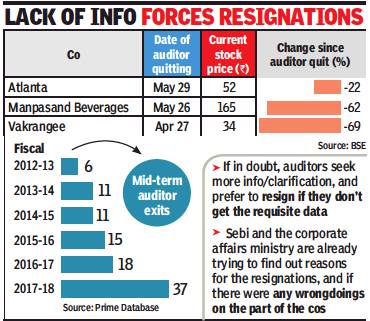Chartered Accountants, Auditors: India
This is a collection of articles archived for the excellence of their content. |
Contents |
Auditor exits (auditors leaving mid-term)
2012-18

From: Partha Sinha & Lubna Kably, ‘Auditor exits from cos good in long term’, June 8, 2018: The Times of India
Stocks Take A Hit But Quitting Seen As Cleansing Exercise, To Boost Governance
Auditors halting assessment of listed companies could bring short-term pain for shareholders in the form of a sharp fall in stock prices. But decisions like these are good for the long-term health of the overall market, as such steps could eventually lead to better corporate governance standards among listed companies.
According to advisers for good corporate governance processes, lawyers and auditors, for too long, companies manipulated books and got away with the same. But stricter rules and regulatory oversights, combined with better disclosure standards and shareholders’ apathy towards these stocks, are forcing such companies to come clean.
So far, 37 auditors have quit the assessing books of companies for fiscal 2017-18. Of these, 15 resigned from the process in May and seven in April this year, data from Prime Database showed. Stock prices of some of the companies that have seen auditor exits — like Atlanta, Manpasand Beverages and Vakrangee — have crashed up to 69% since the news about auditor resignations were made public, BSE data showed. Sebi and the ministry of corporate affairs are already on the trail to find out the reasons for the resignations and if there were any wrongdoings on the part of the companies.
According to Kalpana Unadkat, partner at Khaitan & Co, penal consequences for auditor negligence are now tougher under Companies Act, 2013. The Act provides for a strict set of duties and responsibilities for auditors, such as duty to report fraud. It also prescribes severe penal consequences in case of non-compliances. “The law requires auditors to pay damages to shareholders and statutory bodies for loss arising out of incorrect or misleading statements in their audit report. We have seen that Indian courts have allowed Sebi to take action against auditors if there is any adverse impact on the securities market or for protection of the interest of the investors,” Unadkat said.
Although auditors were required to be careful at all times, of late, due to enforcement actions, “auditors in general are more guarded”, Unadkat said. “If in doubt, they are seeking more information/clarification, and prefer to resign, if they don’t get the requisite information. They are responsible to stakeholders and they should give relevant reasons for their resignation,” Unadkat added.
For example, in its letter about quitting from Vakrangee, a partner for its auditor Price Waterhouse noted that it had asked for information about bullion and jewellery businesses. The replies it got were either inadequate or they did not answered the queries. After back and forth between the auditors, the company’s audit committee members and its MD, Price Waterhouse, finally quit on April 27.
According to J N Gupta, founder of corporate governance research firm Stakeholders Empowerment Services, there are at least four reasons why auditors are quitting midway into their job. For one, there is increased focus on transparency in the corporate sector, which went up further after Prime Minister Narendra Modi spoke last July at an ICAI event and questioned their integrity. Second, Sebi — following recommendations of the Kotak committee on corporate governance — has made it mandatory for auditors to detail reasons for their resignation. Another reason is that the Insolvency and Bankruptcy Code (IBC) allows for a forensic audit of a company’s books, which can subsequently nail auditors if they are found to have erred during the audit process. And last, Sebi’s decision to penalise Price Waterhouse for its role in Satyam scam.
Multinational auditors
SC suggests curb on their illegal operations
The Supreme Court took serious note of alleged illegal operations of multi-national accounting firms (MAFs) in India in collaboration with Indian charted accountancy firms (ICAFs) and asked the Centre on Friday to examine steps to rein them in.
“The Union of India may constitute a three-member committee of experts to look into the question whether, and to what extent, the statutory framework to enforce the letter and spirit of Sections 25 and 29 of Chartered Accountants Act and the statutory code of conduct for CAs requires revisit so as to appropriately discipline and regulate MAFs,” a bench of Justices Adarsh Kumar Goel and Uday Umesh Lalit ordered.
Petitioner S Kumar and NGO Centre for Public Interest Litigation had alleged that MAFs, operating illegally in India in contravention of the CA Act and providing accounting, auditing, book keeping and taxation services, were found indulging in falsification of accounts leading to major scams like the one involving Satyam Computers.
The NGO, while seconding Kumar’s allegations, had alleged: “PricewaterhouseCoopers Private Ltd and their network audit firms operating in India... have indulged in violation of FDI policy, RBI Act and FEMA, which requires investigation.”
Taking note of the facts, the bench said: “The ED may complete the pending investigation within three months. In the present context... it may prima facie appear there is violation of statutory provisions and policy framework.”
The bench tasked the three-member expert committee, to be constituted within two months, to consider steps for effective enforcement of provisions of the FDI policy and FEMA regulations. “It may identify the remedial measures which may then be considered by appropriate authorities. Report of the committee may be submitted within three months of it being constituted. The Union government may take further action after due consideration of such report,” the bench said.